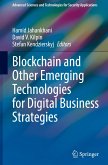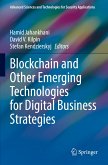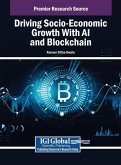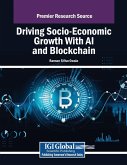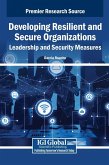The Palgrave Handbook of Breakthrough Technologies in Contemporary Organisations
Herausgegeben:Moussa, Mahmoud; McMurray, Adela
The Palgrave Handbook of Breakthrough Technologies in Contemporary Organisations
Herausgegeben:Moussa, Mahmoud; McMurray, Adela
- Gebundenes Buch
- Merkliste
- Auf die Merkliste
- Bewerten Bewerten
- Teilen
- Produkt teilen
- Produkterinnerung
- Produkterinnerung
This handbook traverses the broad spectrum of ICT management, engaging readers to consider not only the beneficial transformations triggered by these technologies but also the organisational challenges they present. From the disruption brought about by machine learning to the vast opportunities unleashed by the evolution of big data analytics to the revolution of financial technology (FinTech), this handbook offers a thorough and comprehensive journey through the landscape of ICT. The focus is not solely on the breakthrough technologies themselves, but the intricate patterns of their…mehr
Andere Kunden interessierten sich auch für
![The Palgrave Handbook of FinTech and Blockchain The Palgrave Handbook of FinTech and Blockchain]() The Palgrave Handbook of FinTech and Blockchain174,99 €
The Palgrave Handbook of FinTech and Blockchain174,99 €![Blockchain and Other Emerging Technologies for Digital Business Strategies Blockchain and Other Emerging Technologies for Digital Business Strategies]() Blockchain and Other Emerging Technologies for Digital Business Strategies121,99 €
Blockchain and Other Emerging Technologies for Digital Business Strategies121,99 €![Blockchain and Other Emerging Technologies for Digital Business Strategies Blockchain and Other Emerging Technologies for Digital Business Strategies]() Blockchain and Other Emerging Technologies for Digital Business Strategies121,99 €
Blockchain and Other Emerging Technologies for Digital Business Strategies121,99 €![Driving Socio-Economic Growth With AI and Blockchain Driving Socio-Economic Growth With AI and Blockchain]() Driving Socio-Economic Growth With AI and Blockchain284,99 €
Driving Socio-Economic Growth With AI and Blockchain284,99 €![Driving Socio-Economic Growth With AI and Blockchain Driving Socio-Economic Growth With AI and Blockchain]() Driving Socio-Economic Growth With AI and Blockchain216,99 €
Driving Socio-Economic Growth With AI and Blockchain216,99 €![Enhancing Safety, Security, and Service in Organizations Enhancing Safety, Security, and Service in Organizations]() Enhancing Safety, Security, and Service in Organizations187,99 €
Enhancing Safety, Security, and Service in Organizations187,99 €![Developing Resilient and Secure Organizations Developing Resilient and Secure Organizations]() Developing Resilient and Secure Organizations185,99 €
Developing Resilient and Secure Organizations185,99 €-
-
-
This handbook traverses the broad spectrum of ICT management, engaging readers to consider not only the beneficial transformations triggered by these technologies but also the organisational challenges they present. From the disruption brought about by machine learning to the vast opportunities unleashed by the evolution of big data analytics to the revolution of financial technology (FinTech), this handbook offers a thorough and comprehensive journey through the landscape of ICT. The focus is not solely on the breakthrough technologies themselves, but the intricate patterns of their evolution, adoption, management, and the subsequent ripples they create in the organisational fabric. The handbook challenges current views, provokes new insights, and inspires a futuristic view of managing ICT in the ever-evolving business landscape.
Produktdetails
- Produktdetails
- Verlag: Palgrave Macmillan / Springer Nature Singapore / Springer, Berlin
- Artikelnr. des Verlages: 978-981-96-2515-4
- Seitenzahl: 512
- Erscheinungstermin: 9. März 2025
- Englisch
- Abmessung: 241mm x 160mm x 33mm
- Gewicht: 871g
- ISBN-13: 9789819625154
- ISBN-10: 9819625157
- Artikelnr.: 72523081
- Herstellerkennzeichnung
- Springer-Verlag GmbH
- Tiergartenstr. 17
- 69121 Heidelberg
- ProductSafety@springernature.com
- Verlag: Palgrave Macmillan / Springer Nature Singapore / Springer, Berlin
- Artikelnr. des Verlages: 978-981-96-2515-4
- Seitenzahl: 512
- Erscheinungstermin: 9. März 2025
- Englisch
- Abmessung: 241mm x 160mm x 33mm
- Gewicht: 871g
- ISBN-13: 9789819625154
- ISBN-10: 9819625157
- Artikelnr.: 72523081
- Herstellerkennzeichnung
- Springer-Verlag GmbH
- Tiergartenstr. 17
- 69121 Heidelberg
- ProductSafety@springernature.com
Dr Mahmoud Moussa is a lecturer in HRM in the College of Business, Government and Law at Flinders University in Adelaide, South Australia. He is a member of the editorial boards at Emerald Emerging Markets Case Studies. He has been teaching postgraduate and undergraduate Business and Management courses in Thailand and Australia for the last 15 years, and is the author of two books titled Cross-Cultural Performance Management: Transcending Theory to a Practical Framework, 2022, and Innovation and Leadership in the Public Sector: The Australian Experience, 2023. He has published over 50 refereed papers in several reputable journals. He has conducted research and published extensively on human-computer interaction, attitudes and perceptions of interactions within organisations, cross-cultural management, HRD, and HRM. Prof. Adela McMurray is the Dean (People & Resources) at the College of Business Government and Law, Flinders University, Australia. She has experience researching and working in the public and private sectors facilitating organizational change and development. Her work is internationally acclaimed as she has published over 360 publications and won multiple awards and grants to the value of $5million. Her research expertise addresses: Innovation, Culture, Sustainability, Commitment, and Leadership including Organizational Change and Development.
Chapter 1: Leveraging Technology to Track Employee Behaviour and Employee Privacy Concerns.- Chapter 2: A Qualitative Examination of Human Resource Information Systems (HRISs): A Strategic Tool for SMEs in Northern Thailand.- Chapter 3: A Review of Information and Communication Technology (ICT) and Management in Organisations.- Chapter 4: AI Adoption Challenges in Private Firms: Insights from Vendors and Corporate Users.- Chapter 5: The Technological Disruption in Banking Sector New Efforts and Challenges in the Future of Financial Business Models.- Chapter 6: Strategic Factors Influencing AI Adoption in Organisations.- Chapter 7: The Future of Organisational Authenticity in the Age of Artificial Intelligence.- Chapter 8: Realising Co-Development in Digital-Twin Business Ecosystems for Heavy Machinery.- Chapter 9: Machine Learning Based Vulnerability Assessment for The IT Infrastructure of Industrial Companies.- Chapter 10: Spillover Effects of Home-Based Artificial Intelligence Devices on Work Creativity.- Chapter 11: Hybrid Governance for Diverse and Inclusive Digital Platforms.- Chapter 12: Antecedents of Enhancing Diversity and Inclusion with AI Tools - An HR Perspective.- Chapter 13: The Role Of Metaverse Platforms in Organisational Transformation.- Chapter 14: The Influence of Artificial Intelligence on Human Resource Management to Enhance Work Efficiency and Shape Employee Behaviour.- Chapter 15: Navigating Digital Transformation: Integrating The Breakthrough Information Systems and Management in Organisations.- Chapter 16: The surprising structure of future companies.- Chapter 17: Changes of Employees` Skill Requirements Caused by Technological Progress.- Chapter 18: Navigating Uncertainty: Isomorphic Pressures in Cloud Computing Adoption.- Chapter 19: Enhancing Global Talent Management in Contemporary Organisations Through Technology and Information Systems.- Chapter 20: The Human Element in Information.- Chapter 21: Transformative Power of IoT, AI and Blockchain in Healthcare: An Overview.- Chapter 22: Airbnb in Vietnam: The Future of Tourism.- Chapter 23: Examining the Experiences of Visitors - Dark Tourism at the Old Melbourne Gaol: Reviews from TripAdvisor.- Chapter 24: Utilising Agent-Based Modelling and Simulation System-Driven Price Optimisation to Enhance Enterprise Performance.- Chapter 25: How Social Media Affects the Success of Public Health Initiatives.- Chapter 26: Evaluating the Efficacy of Pricing Optimisation Strategies through Agent-Based Modelling.- Chapter 27: Evolution of E-commerce in Business: A Review.- Chapter 28: Conceptual Framework for Analysing Service Innovations, Resources and Dynamic Capabilities in Omnichannel Retailing.- Chapter 29: The Role of Fintech in Advancing Sustainability and Innovation.- Chapter 30: The Role of Fin Tech in Financial Inclusion, Poverty Alleviation and Financial Stability.- Chapter 31: The Impact of Fintech on Global Entrepreneurship and Business Development.- Chapter 32: Advances on Fintech-Based Lending Practices: Orchestrating The Dialogue on Transformative Innovation.- Chapter 33: Concerns about the Rapid Growth of Fintech: Data Privacy, Breach and Cybersecurity Issues and the Resulting Regulatory Reforms.- Chapter 34: Emerging Research on FinTech Companies Products and Services.- Chapter 35: Development and Usage of FinTech in the Emerging Economies.
Chapter 1: Leveraging Technology to Track Employee Behaviour and Employee Privacy Concerns.- Chapter 2: A Qualitative Examination of Human Resource Information Systems (HRISs): A Strategic Tool for SMEs in Northern Thailand.- Chapter 3: A Review of Information and Communication Technology (ICT) and Management in Organisations.- Chapter 4: AI Adoption Challenges in Private Firms: Insights from Vendors and Corporate Users.- Chapter 5: The Technological Disruption in Banking Sector New Efforts and Challenges in the Future of Financial Business Models.- Chapter 6: Strategic Factors Influencing AI Adoption in Organisations.- Chapter 7: The Future of Organisational Authenticity in the Age of Artificial Intelligence.- Chapter 8: Realising Co-Development in Digital-Twin Business Ecosystems for Heavy Machinery.- Chapter 9: Machine Learning Based Vulnerability Assessment for The IT Infrastructure of Industrial Companies.- Chapter 10: Spillover Effects of Home-Based Artificial Intelligence Devices on Work Creativity.- Chapter 11: Hybrid Governance for Diverse and Inclusive Digital Platforms.- Chapter 12: Antecedents of Enhancing Diversity and Inclusion with AI Tools - An HR Perspective.- Chapter 13: The Role Of Metaverse Platforms in Organisational Transformation.- Chapter 14: The Influence of Artificial Intelligence on Human Resource Management to Enhance Work Efficiency and Shape Employee Behaviour.- Chapter 15: Navigating Digital Transformation: Integrating The Breakthrough Information Systems and Management in Organisations.- Chapter 16: The surprising structure of future companies.- Chapter 17: Changes of Employees` Skill Requirements Caused by Technological Progress.- Chapter 18: Navigating Uncertainty: Isomorphic Pressures in Cloud Computing Adoption.- Chapter 19: Enhancing Global Talent Management in Contemporary Organisations Through Technology and Information Systems.- Chapter 20: The Human Element in Information.- Chapter 21: Transformative Power of IoT, AI and Blockchain in Healthcare: An Overview.- Chapter 22: Airbnb in Vietnam: The Future of Tourism.- Chapter 23: Examining the Experiences of Visitors - Dark Tourism at the Old Melbourne Gaol: Reviews from TripAdvisor.- Chapter 24: Utilising Agent-Based Modelling and Simulation System-Driven Price Optimisation to Enhance Enterprise Performance.- Chapter 25: How Social Media Affects the Success of Public Health Initiatives.- Chapter 26: Evaluating the Efficacy of Pricing Optimisation Strategies through Agent-Based Modelling.- Chapter 27: Evolution of E-commerce in Business: A Review.- Chapter 28: Conceptual Framework for Analysing Service Innovations, Resources and Dynamic Capabilities in Omnichannel Retailing.- Chapter 29: The Role of Fintech in Advancing Sustainability and Innovation.- Chapter 30: The Role of Fin Tech in Financial Inclusion, Poverty Alleviation and Financial Stability.- Chapter 31: The Impact of Fintech on Global Entrepreneurship and Business Development.- Chapter 32: Advances on Fintech-Based Lending Practices: Orchestrating The Dialogue on Transformative Innovation.- Chapter 33: Concerns about the Rapid Growth of Fintech: Data Privacy, Breach and Cybersecurity Issues and the Resulting Regulatory Reforms.- Chapter 34: Emerging Research on FinTech Companies Products and Services.- Chapter 35: Development and Usage of FinTech in the Emerging Economies.



